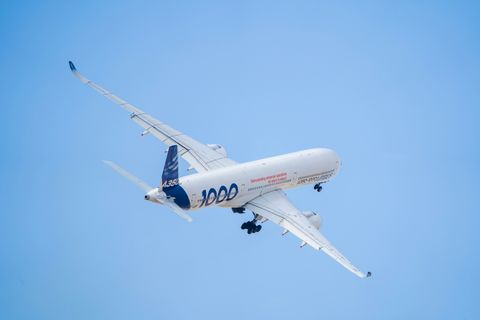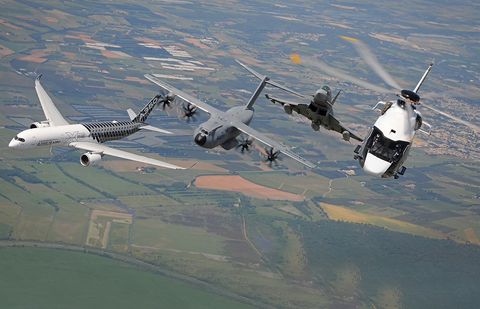Airbus Helicopters' chief priority is to support flight safety for the thousands of men and women around the world who are transported in its aircraft every day. Not only do we strive to constantly improve the safety of our products, but we also focus on the operational safety of those products even after they are delivered to the customer. Safety in operations is key to meeting our Airbus goal of zero safety incidents.

Safety by training
As part of its commitment to improving aviation safety, Airbus provides realistic, mission-focused training for its complete product line, which prepares flight personnel and maintenance crews for real-world situations. Quality training is directly linked to pilots and flight crews’ proficiency, as well as their ability to safely operate in a full range of conditions.
To ensure customers have access to world-class training, Airbus continues to make significant investments in full-motion simulators, procedural training devices, computer-aided training and e-learning systems.
With an original equipment manufacturer (OEM) data package, Airbus can ensure that the latest rotorcraft developments and improvements are reflected in its simulator network. In addition, the implementation of an extended field of view (in the full-flight simulator (FFS), along with the integration of real rotorcraft data tested by Airbus test pilots guarantee a real-to-life full flight simulation.
In parallel, Airbus’ helicopter division focuses on expanding the catalogue of services it offers – particularly for recurrent and mission training – with on-site flight operations support deployed worldwide to increase safety. This provides a comprehensive suite of services, including customer help desks and flight operations support and analysis – all tailored for individual operator needs.
In order to remain close to its customers and provide cost-effective solutions for fleets to remain operationally available, Airbus – with its customer centres and affiliates – operates a network of 23 training centres and 26 full-flight simulators in all regions of the world, including Europe, North America, Asia-Pacific, Africa and the Middle East, and South America.
Safety by SMS
With support for industry-wide initiatives like the Vertical Aviation Safety Team (VAST), Airbus works with its customers to introduce safety management systems (SMS) as part of its commitment to improving global flight safety and decreasing accidents. An SMS is an important tool for supporting safe helicopter operations through a reactive, proactive and predictive organisational approach to safety risks. One of its aims is to actively promote a safety culture – employing safety-driven decision making and risk management.
Airbus has deployed an aviation SMS because of the company’s strong belief that SMSs contribute greatly to improving helicopter safety. Likewise, it has contributed to several international working groups aimed at raising the standards of aviation safety management systems.
Airbus works with its customers to introduce safety management systems within their organisations as part of its commitment to improving global flight safety and decreasing accidents.
The company provides information on the importance of hazard identification and risk management to reduce risk levels on-the-ground and in-flight, and also establishes a method to define specific daily operational hazards, identify the potential consequences of these hazards, and propose corrective and protective measures to prevent or mitigate such hazards.
For more on Airbus assistance in introducing an aviation safety management system, see the Information Notice IN2255-I-00 (.pdf format) and visit Airbus International Services.
Safety media & e-learnings
Airbus Helicopters provides a selection of videos from our Safety Conferences, Approved Training Center and Maintainability Analysis team, along with e-learnings to support your operational safety.
Safety documents
Airbus Helicopters makes available key information for improving helicopter safety throughout the industry. This covers:
Maintenance safety
Maintenance proper practices
Proper maintenance practices play a crucial role in supporting helicopter safety. Airbus has decades of maintenance expertise and is well equipped to address the full spectrum of operator maintenance needs, from providing the best maintenance tools to promoting adherence to approved maintenance procedures and schedules.
Airbus Customer Service teams are the customer’s primary entry point to maintenance activities and available services. The three main maintenance pillars related to safety are maintenance procedures, maintenance documentation and maintenance training.
Maintenance procedures
Airbus works closely with customers to support their maintenance teams, whether ensuring adherence to existing maintenance procedures and inspection schedules, applying Service Bulletins and Airworthiness Directives, or developing new services that simplify and optimize customers’ maintenance organisations.
The company also promotes the proper use of maintenance technologies that aid operational safety. For example, the Health & Usage Monitoring Systems (HUMS) provide invaluable helicopter information that helps maintenance teams make the right decisions to keep an aircraft airworthy. Guidance on how to use and interpret HUMS data is one of the key supports that Airbus provides to its customers.
Airbus also applies a sophisticated Human Factors methodology to enhance the safe handling of critical maintenance tasks; this methodology has been endorsed by HeliOffshore to improve frontline safety.
Maintenance documentation
Airbus’ online technical data service, available via the AirbusWorld collaborative platform – provides operators with complete, accurate and up-to-date documentation to support safe operations and maintenance of their helicopters.
TechData subscribers receive notifications whenever a new publication is added or updated – including Service Bulletins, Airworthiness Directives and Safety Information Notices. In this way, customers have at their fingertips real time-access to the latest technical information that could impact the safe operation of their aircraft.
More on TechData and AirbusWorld
Maintenance training
Airbus offers a wide variety of classroom and hands-on courses designed to teach aircraft maintenance engineers how to maintain their helicopters in accordance with the aircraft maintenance manuals and regulations.
The courses cater to all levels, from new technicians in need of type rating training to more experienced mechanics in need of periodic refreshers courses, known as recurrent training.
The company has hardware and systems available for maintenance training at its 23 training sites around the world. Maintenance training for new products – such as the H175 and the H145 – is an indispensable part of an aircraft’s support package.



Safety by cooperation
Airbus is a responsible member of the international helicopter community, sharing its values with the industry and actively contributing to key rotorcraft safety goals. Supporting the safety initiatives of leading organisations, institutes, steering groups and governmental agencies around the world is a key company priority.
Airbus works closely with the Vertical Aviation Safety Team (VAST) – and its European component: the European Safety Promotion Network Rotorcraft (ESPN-R) – which brings together government and industry leaders to reduce civil rotorcraft accidents. VAST was formed in 2021 and was the successor of the International Helicopters Safety Team (IHST) which was formed in 2006. It aims to dramatically reduce the international civil helicopter accident rate.
Further reinforcing the company’s cooperation in industry-wide safety initiatives, Airbus has issued a Flight Crew Operating Manual (FCOM) for H225 aircraft that are utilised for oil and gas missions, marking the first such source document created in the rotorcraft sector.
Airbus takes a proactive approach in listening to customers’ requirements in order to meet and surpass their expectations. The company also works with its customers to support the safe operation of their Airbus rotorcraft. This includes regularly hosting and participating in symposiums and forums, distributing safety materials to help customers manage operational risks and supporting operators’ application of helicopter flight data management (HFDM) systems.
In addition, the company leverages the expertise and know-how of its supplier base to support safety and quality, engaging its supply chain through a collaborative approach and shared view of customer expectations.

Vertical Aviation Safety Team
An industry-wide effort to improve rotorcraft safety is headed by the Vertical Aviation Safety Team (VAST), which was formed in 2021.
As the world’s no. 1 helicopter manufacturer, Airbus Helicopters takes a leadership role in this important safety initiative. As part of this commitment, the company is a major sponsor of the organization’s annual safety symposium which is open to all aviation safety professionals within the helicopter community
Aiming to realize an international civil helicopter community with zero accidents, VAST works with global partners – such as Airbus Helicopters – and regional safety teams to develop strategies and harmonize safety efforts in key areas, including:
- Educating target audiences on helicopter safety and accident causes;
- Updating the progress toward VAST goals;
- Conveying information about global partnership efforts within VAST;
- And, raising awareness on VAST tools that can improve helicopter safety.
Nearly 40 countries support VAST's efforts, with safety teams established in Europe, the United States, Canada, Brazil, India, Japan and the Middle East-North Africa region.
Visit the Vertical Aviation Safety Team official website for more information
HeliOffshore
HeliOffshore is a global, safety-focused association for the offshore helicopter industry. In collaboration with Airbus and others in the global offshore helicopter industry, HeliOffshore’s aim is to deliver industry-wide safety programmes to enhance safety worldwide.
With our common goal towards achieving zero lives lost in offshore flight, Airbus, with the collaboration of HeliOffshore, has spearheaded the following projects:
- The introduction of FCOMs (Flight crew operating manuals) for offshore operations to bridge the gap between the Flight Manual and the Operations Manual. This is presently in the rulemaking process to become a standard for commercial operations in Europe.
- Enhancing the safe handling of critical maintenance tasks by applying a sophisticated Human Factors methodology which has been endorsed by HeliOffshore to improve frontline safety.
- Contributing to HeliOffshore’s Human Hazard Analysis (HHA) standard, which optimises critical tasks with a dedicated Human Factor centred analysis and improvement process. The HHA is applicable to the H225, H175 and H160 and is planned to be rolled out to other helicopters in the range as well.
Outreach to customers
Airbus Helicopters maintains a close relationship with customers to improve rotorcraft safety, and provides around 200 safety promotion events annually.
The company – and its worldwide network of customer centers and affiliates – regularly hosts symposiums and forums for its operators, allowing them to get the latest safety and technical updates, as well as provide feedback on key issues. Examples include the annual national and regional customer service symposiums hosted by company’s Airbus Helicopters, Inc. U.S. affiliate, as well as an oil and gas forum for Asian operators, among many other initiatives around the world which cover topics including safety and training.
Airbus Helicopters also reaches out to its customers through events that help operators establish a top-notch safety culture – such as the CHC Quality & Safety Summit, which brings together leading aviation, oil and gas, insurance and regulatory experts to promote aviation safety
As a leading helicopter manufacturer, Airbus Helicopters is committed to fostering a culture of safety within the company, and sharing it with the industry. Safe operation of its in-service rotorcraft is supported by the company’s outreach – which includes working with operators on such key topics as safety management systems, risk management, helicopter flight data management (HFDM) systems, comprehensive analysis of training systems, and more.
Safety events
Changing aviation culture with Safety Roadshows
Technologies and tools have evolved to improve aviation safety, but there is still work to be done throughout the industry to reach the EASA vision of significantly reduced accident rates. Airbus has launched Safety Roadshows to address and reduce the number of accidents due to operational factors, the main cause behind most rotorcraft accidents. Watch the video to learn more.
Safety Roadshow
CHC Safety and Quality Summit
Airbus actively supports initiatives to improve fleet safety around the world. This involves close interaction with its customers to obtain feedback on their needs and challenges, along with active participation in meetings, symposiums, forums and other industry events.
Airbus has sponsored the CHC Safety and Quality Summit for the past several years, an event that promotes a high level of aviation safety through “safety by cooperation and collaboration.” Airbus helicopter safety experts also actively contribute as speakers at this event.
Learn more about the CHC Safety & Quality Summit
Check back regularly for the latest safety-related events from Airbus’ helicopter division.
Safety Roadshow
Discover more about safety in operations
Discover Safety at Airbus
Latest news









